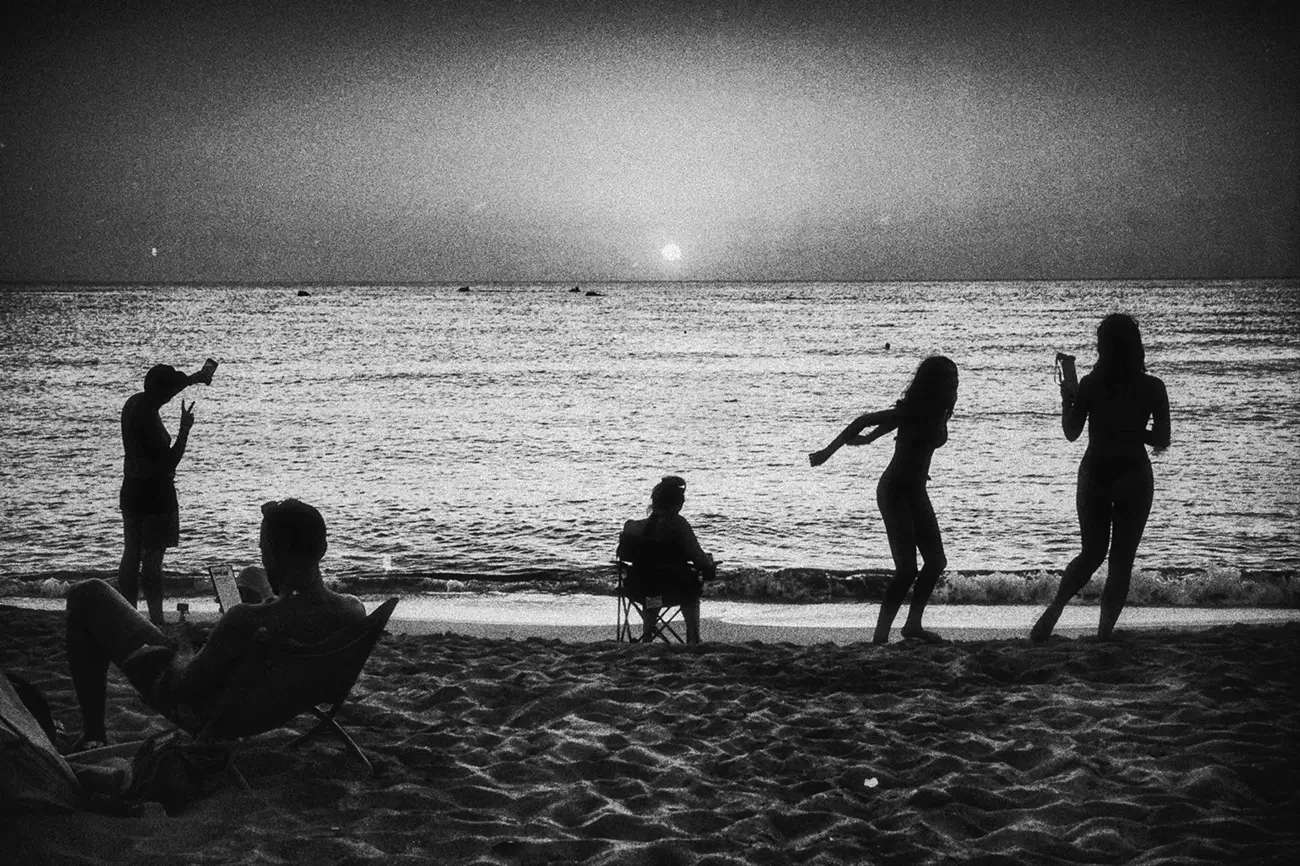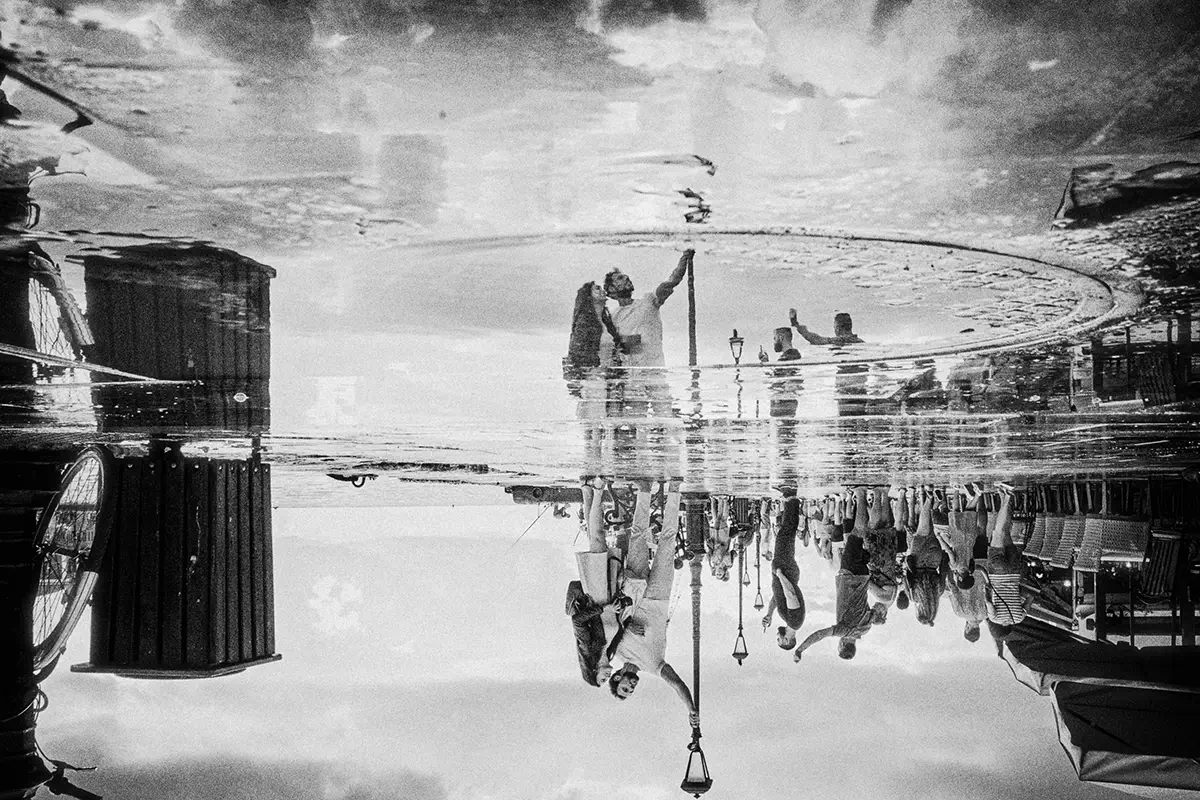Falassarna is a beautiful beach in the west of Chania, on the island of Crete.
One of the reasons to go to Falassarna is for its sunset. The sun goes out like a fireball falling into the sea.
For millions of years man has been experiencing these moments with a mystical bliss. In the last 15 years, for the first time in human history, this has changed.
More and more people are not seeing the sunset; they are not experiencing the sunset. And when they do see it, they do so through an intermediary. The intermediary is a screen that acts as a machine for capturing moments that will be transformed into content that will feed user accounts on social media platforms.
This photo was taken in Falassarna as the sun was setting.
The photo shows five people. Two of them are watching their screens and are indifferent to the sight of the setting sun while the other three are involved in producing the content that they will then post to their social media accounts. They pose and gesture in front of the sunset, with the aim of producing material that will increase their chances of getting as many likes as possible.
Sunsets as well as selfies are two types of posts that the algorithm favours their spread and will produce an increased number of likes.
More and more we are not experiencing the beauty around us but looking at how to produce material from it that will feed our social media accounts. And the phenomenon is not limited to sunsets. Many times we prefer instead of experiencing an event to capture it in order to spread its image through social media.
I don't think we realize how truly unique what is happening in our lives through the dominance of mobile phones over the last 10 years is. The constant reliance on connected mobile devices is not only affecting the way we communicate with each other, but also the way we look, behave and experience the world around us.
Smart phones have become extensions of the self, tools from which we cannot escape.
We are gradually losing our ability to experience. We spend so much time capturing each moment that we become unable to absorb them as they happen.
When you take a picture of yourself in front of a sunset, you are actually creating a distance from the moment you are trying to capture. Those 5 people at Falassarna are experiencing the digital capture of the sunset not the actual sunset. They lose their ability to focus on what is happening in front of their eyes. They lose the ability to really see the beauty without the distance or they are indifferent to it.

Sunset © Giannis Angelakis
A photo of a sunset becomes part of a user’s digital identity that stays forever or until we decide to delete it. It becomes a part of a puzzle that reveal the digital self whose existence has real-life implications. What we post is what we sell to others we are. We become brands who compete against each other in the attention economy.
We also, as photographers, depend on the digital persona we build.
We are under a pressure to constantly present new material through our social media accounts. We are punished by the algorithm if the ratio is not satisfactory. We produce more material that “works better” on Instagram, photos made to be viewed through the small screens of mobile phones. Some of us produce glorious images of sunsets. We post them in a way and order that visually satisfies the senses. We try to keep the attention of other users on us as much as possible in a world where attention is a precious limited resource for which competition is constantly intensifying.
We seek the greatest possible visibility. We chase virality.
More and more, we learn to act as if we are celebrities, personas in some Big Brother show whose success depends on the attention and love of the audience. We depend on likes. We depend on sunsets and selfies.
The Kardashians are the personification of a certain whole dominant philosophy, according to which anyone can succeed as long as they are “liked,” as long as their presence creates interest. As long as he is popular enough.
The word “branding” is perfectly suited to what is happening, as it emphasizes what the self becomes: a product.
The rise of smartphones made it possible to produce material 24 hours a day.
Programs on smartphones make photo and video editing quick and easy in a way we couldn’t have imagined until a few years ago. This increases the user’s ability to provide constant updates to their social media accounts and makes it easier to produce material to build the brand that is themselves.
The lives of a huge number of people depend on their social media image and the photos they post, and controlling that image becomes crucial.
The digital self has power over the real self.
The more power it has, the more time it seems we spend in front of screens and less with people.
Today, an average person spends an average of 6 hours and 37 minutes every day in front of a screen. The corresponding numbers for Gen Z (born between 1996 and 2010) are even worse: they spend over 9 hours a day in front of screens.
People spend 44% of their time when they are awake in front of screens. The majority of this time (3 hours and 46 minutes) is spent in front of mobile phones.
We are increasingly judging people based on what we see about their lives through screens, not the communication we have with them in the real world. We make decisions about people based on our impressions of their digital personas as we see them unfolding on the platforms of tech giants in front of screens.
The more time we spend in front of screens, the more lonely we feel.
According to a recent survey by Cigna, younger people are the ones who suffer the most from loneliness.
Since 2012, in both the U.S. and the U.K., rates of depression among teenagers have started to rise. By 2019 — even before the COVID-19 pandemic hit — they had doubled. More and more teens around the world said they felt lonely and as outsiders at school. This wasn’t just because teenagers were more likely to admit to negative feelings — behaviors linked to poor mental health, such as self-harm and suicide attempts, also increased around the same time.
The cause of these trends appears to be linked to smartphone use.

Sunset © Giannis Angelakis
From 2012 onward, more people started using smartphones and were on social media for several hours a day. At the same time, teens also began spending less time with their friends in person while sleeping less time.
The following data are also typical:
Generation Z, the generation that spends the most time in front of screens to communicate, is the loneliest generation. The generations over 72 are the ones who are least lonely.
This is a reversal of the reality that was true until a few years ago, when the problem of loneliness was mainly related to older people.
We don't experience the world, we see it through our screens. We become spectators of reality. We observe from a distance. We separate ourselves from reality. We lose the ability to be present. We lose the experience of reality. We become more and more lonely.
James Williams, a former Google engineer, believes that the solution does not lie in the individual. Individual avoidance of technology use is not the solution, just as wearing a mask two days a week to avoid getting sick from a pollution offers no solution to the issue of pollution. It may improve things somewhat on an individual level for a short period of time, but it is not sustainable in the long term and does not address the systemic issues. Our attention is the focus of interest of giant powers with huge economic interests. To say that the solution is simply to adjust your individual habits is like pushing the blame for a systemic problem back on the individual when broader changes are needed that will bring about real change for everyone regardless of the individual's ability to seek and achieve some solutions.
There are many changes that need to be made that will restore some of our ability to focus on the now, the real world, not the digital world. We could force the social media giants to abandon their operating model designed to hijack our attention so that we continue to scroll through their endless feeds of material we produce.
There are alternative ways that these platforms could operate that could heal our attention rather than hack it. It would mean their profits would be less, but the benefit to humanity would be enormous.
Not only would we have more time, we would have saved our attention to devote it to the big issues that we as humans need to spend time and thought on, but also to give attention back to our people, to ourselves. To really experience reality, to see sunsets. To live more without mediation.
To take photos without caring about the number of likes we get. Without our self-esteem, success or financial survival depending on the number of likes posts we make get on our social media accounts.
Without turning ourselves into a brand with power over our lives.

Sunset © Giannis Angelakis
My name is Giannis Angelakis and I am from Chania, Crete. I was born in 1979 and have lived most of my life in Chania. I spent some years in England where I did a degree at Cultural and Media Studies at the University of Wolverhampton (BSc) and studied at the Centre for Contemporary Cultural Studies and Sociology at the University of Birmingham (MPhil).
I started taking photos quite later in my life, at 2011, mainly due to my work as a journalist. Soon, however, I realized that I was particularly interested in street photography as a form of art that relies on discovering patterns and capturing life as it happens.
Through my work I document the importance of everyday life as it manifests through gestures and movements, bringing back to the surface the richness of life behind the touristic product named Crete.
Living in times where the economic crisis had a huge impact on everyday life in Greece much of my material is crisis related.
Some key infuences are Walter Evans, Elliott Erwitt, Robert Frank, Saul Leitter, Robert Doisneau, Shirley Baker, Tish Murtha, to name just a few.
www.giannisangelakis.com
@angelakis_gianis

Sunset © Giannis Angelakis





